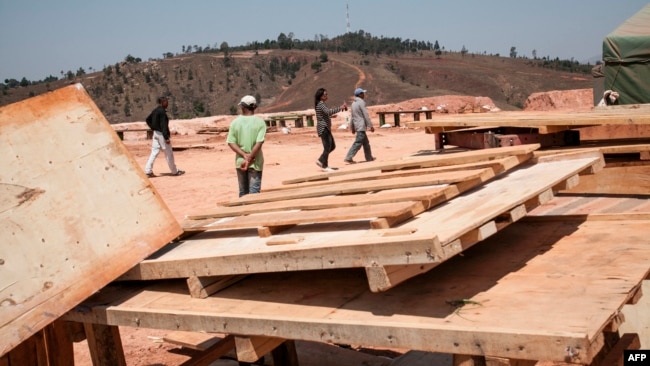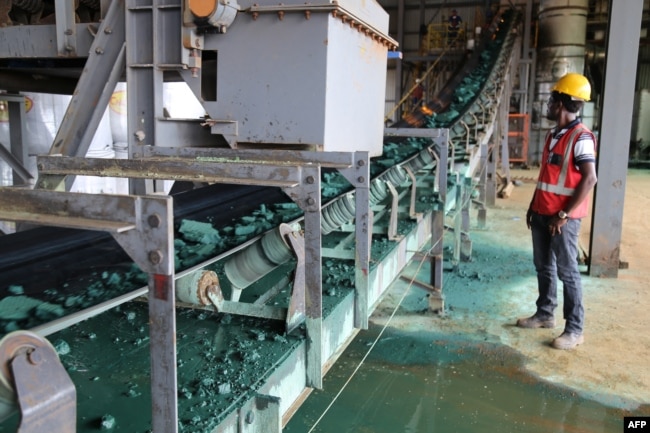アフリカでの中国の振る舞い
ここで言う”local laws”とは、どっちの国のことでしょう?
まぁ、それは明らかですね。
人権という思想、権利を有しない国なのですから。
いつもながら、金にものを言わせ、他国の政府を抱き込む、好き勝手に振る舞う GDP第2位の経済大国。
さぁ、これは先進国???? 彼らの目指す社会主義先進国!!
VOAで英語を学びましょう!!
アフリカで、中国の雇用主が虐待で訴えられる (和訳)
In Africa, Chinese Employers Accused of Abuse
May 16,2022
中央アフリカのルワンダの裁判所は先月、中国人男性Sun Shujunに懲役20年を言い渡しました。Sunは、労働者を鞭打つ動画がインターネット上で拡散された後、有罪となっ理ました。
この事件は多くのアフリカ人を怒らせました。この判決を受けて、ルワンダの首都キガリにある中国大使館は、珍しい声明を発表しました。ルワンダの首都キガリにある中国大使館は、ルワンダの国民に対し、現地の法律に従うよう警告しました。
ビジネスと人権リソースセンターは昨年、この件に関する報告書を発表しています。英国に本拠を置くこの非営利団体は、2013年から2020年の間に、アフリカにおける中国の投資活動に関連した人権侵害の訴えが181件あったことを明らかにしています。事件の多くはウガンダ、ケニア、ジンバブエ、コンゴ民主共和国(DRC)で発生したものです。
昨年、ケニア人労働者が中華料理店の雇い主に殴られ、裁判所から2万5000ドル以上の賠償金を受け取りました。ケニアの裁判所は、この男性が極度の虐待を受けていたことを認めました。
また、ケニアで中国が建設した鉄道で働く地元の人々を、中国人の雇用主が虐待しているという報告もあります。スタンダード紙が2018年にそのことを報じています。
コンゴ民主共和国は、鉱物資源が豊富とされています。同国には、中国企業が運営する鉱山も多く存在します。そこでは、虐待の主張も伝えられています。コンゴの調査ジャーナリストは、中国資本の小規模鉱山が児童労働を利用している様子を詳細に伝える報告書を発表しました。
ジョズエ・カシャール氏はコンゴの非営利法律支援団体の弁護士です。彼は、中国の鉱山で事故に遭い、負傷した地元の鉱山労働者の弁護を担当しました。裁判の結果、鉱山は労働者の入院費と逸失利益を支払うよう命じられました。「労働者の権利の侵害はたくさんあります。」とカシャル氏はVOAに語りました。
ジンバブエでも、中国人の雇用主による虐待が報告されています。2020年、グエルという町にある鉱山で、中国人の雇用主が賃金問題を起こした後、ジンバブエ人労働者2人を撃ち、重傷を負わせました。この雇用主は殺人未遂で起訴され、現在も裁判が行われています。
シャミソ・ムティシ氏はジンバブエ環境法協会(ZELA)の理事を務めています。彼は、「ZELAは、中国の雇用主によるジンバブエ人労働者の虐待のいくつかの事例を知っています。そしてこれは、中国のいくつかの鉱山会社で定期的に起こっています。」と言います。彼は、「問題は、彼らが自分たちを優れていると考えていることだと思う 。」とコメントしました。
ムティシ氏によると、国内の中国系鉱山の労働者は給料が安く、貧弱な保護具を与えられているとのことです。しかし、職場のルールを徹底し、国民を守るのはジンバブエ政府であると彼は指摘します。中国がジンバブエで最大の外国人投資家であるため、政府はそれを怠っていると彼は言います。
「この深刻な問題は、中国人は政府や政治家から何らかの保護を受けているように見えます、ですから彼らはこのことから通常であれば逃げるのです。」と彼は言います。
中国の習近平指導者は、中国の一帯一路(Belt and Road)構想を推進しています。この構想は、開発プロジェクトに資金を提供するものです。この構想により、中国はアフリカで影響力を持つようになりました。アフリカ諸国は、人権の要件を含まない中国の融資を好んでいます。
在ナミビア中国大使館は最近、こうした事件のいくつかに答えるためのガイドを発表しました。その中には、現地労働者との賃金紛争にどう対処するか、労働者を脅すために銃器を使用しない、身体的虐待によって労働者を”威嚇・強要”しない、といったアドバイスが含まれています。そして、自分一人で抱え込まずに、必ず現地の役人を巻き込んで事件に対処するようアドバイスしています。
In Africa, Chinese Employers Accused of Abuse
A court in the central African country of Rwanda sentenced Chinese man Sun Shujun to 20 years in jail last month. Sun was found guilty after a video of him whipping a worker spread across the internet.
The case angered many Africans. Following the decision, the Chinese embassy in the Rwandan capital of Kigali made a rare statement. It warned its citizens in Rwanda to follow local laws.
The Business and Human Rights Resource Center released a report on the subject last year. The non-profit, Britain-based group found 181 claims of human rights abuses connected to Chinese investment activities in Africa between 2013 and 2020. Many of the incidents were in Uganda, Kenya, Zimbabwe, and the Democratic Republic of Congo (DRC).
Last year, a Kenyan worker was awarded more than $25,000 by a court after he was beaten by his Chinese restaurant employer. A Kenyan court found the man had suffered extreme abuse.
There have also been reports of Chinese employers mistreating local people who worked on a Chinese-built railway in Kenya. The Standard newspaper reported about that in 2018.
The Democratic Republic of Congo is estimated to be rich in mineral resources. The country also has a large number of mines that are operated by Chinese companies. Claims of abuse have also been reported there. A Congolese investigative journalist released a report detailing how small Chinese-owned mines are using child labor.
Josue Kashal is a lawyer from a Congolese non-profit legal assistance group. He represented a local miner who was injured in an accident at a Chinese mine. A court decision ordered the mine to pay the worker’s hospital costs and lost earnings. “There are lots of violations of workers’ rights,” Kashal told VOA.
In Zimbabwe, there also have been reports of abuses by Chinese employers. In 2020, a Chinese employer shot and seriously injured two Zimbabwean workers after a pay dispute at a mine in the town of Gweru. The employer was charged with attempted murder and the case is still being tried.
Shamiso Mtisi is a director of the Zimbabwe Environmental Law Association (ZELA). He said “ZELA is aware of several cases of abuse of Zimbabwean workers by Chinese employers, and this happens on a regular basis at some of the Chinese mining companies.” He commented, “I think the problem is they see themselves as superior.”
Words in This Story
whip – v. to hit (a person or animal) with a whip or with something that is like a whip
award –v. to officially decide someone should get something
journalist –n. someone whose job it is to collect, write or edit stories for newspapers, magazines, television and other media
regular basis –n. doing something systematically so it takes place at a regular time somewhat often
Mtisi said workers at Chinese-owned mines in the country are paid little and given poor protective equipment. But, he noted, it falls on the Zimbabwean government to enforce workplace rules and protect its citizens. And he says the government is failing to do so because China is the country’s largest foreign investor.
“The challenge is the Chinese appear to be getting some protection either from government or some politicians, so they normally get away with it,” he said.
Chinese leader Xi Jinping has pushed China’s Belt and Road Initiative. It provides money for development projects. With it, China has gained influence in Africa. African countries favor China’s loans that do not include human rights requirements.
The Chinese Embassy in Namibia published a guide recently to answer some of these incidents. It included advice on how to deal with pay disputes with local workers, not using firearms to threaten workers, and not “intimidating or coercing” workers through physical abuse. And it advised to always deal with incidents by involving local officials instead of taking things into one’s own hands.

